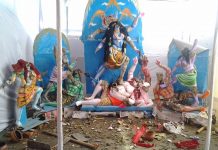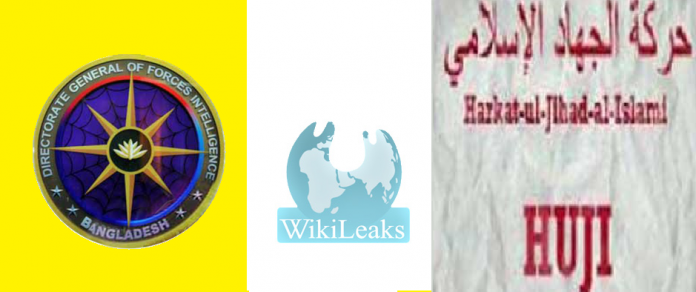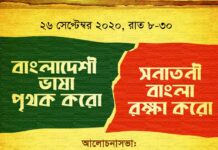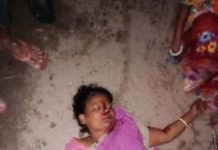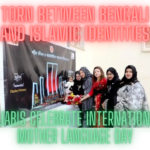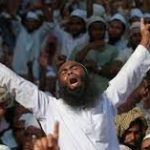WikiLeaks has been publishing the secret US documents for the last few years. The documents also include a number of Dhaka embassy telegrams sent to Washington, some of which have already been published by different media and exposed our politicians, governments, government agencies and others.
Now it has been proved that during the army-backed caretaker government, some people tried to implement minus-two formula (excluding Hasina-Khaleda from politics) when the army’s Directorate General of Forces Intelligence (DGFI) was tasked with this agenda. The DGFI took measures to reform the Awami League and the BNP with second-tier leaders, who were against the dynastic politics by corrupt leaders. Some joined the reformist groups to avoid arrest.
DGFI is a military service that supplies the Bangladeshi Government with both national and foreign intelligence. Their activities are highly classified and confidential to both mass media and civilians. According to the US embassy officials in Dhaka, people are afraid to speak publicly about the DGFI.
In 2008, Harkat-ul-Jihada-Al-Islami Bangladesh (Huji), an international terrorist group also banned in Bangladesh, was given the shape of a political party named Islamic Democratic Party (IDP). It was terrible that the process took place smoothly in public only because of the DGFI’s involvement. No one could raise a question against the move. But now that WikiLeaks has revealed DGFI’s involvement with the militant group through the US embassy officials, let’s talk about it in details.
Let me give you an example how Huji is still operating in Bangladesh, nearly 11 years after it was banned for carrying out terrorist attacks that killed dozens of people. On July 8, 2016, head of police’s counter-terrorism unit Monirul Islam said that the Bangladeshi militant group Huji was receiving funds from abroad to financially assist the families of at least 51 families. It means the group is still active.
The Soviet–Afghan War lasted over nine years from December 1979 to February 1989. Insurgent groups (“the Mujahideen”) fought against the Soviet Army and allied Afghan forces. Between 850,000–2 million civilians were killed and millions of Afghans fled the country as refugees, mostly to Pakistan and Iran. The war is considered part of the Cold War. In this period, from Bangladesh so many Islamic Mujahideen went to Afghanistan to fight against Communism/Soviet. Those who were able to return from demilitarize zone, brought extreme Islamic ideology to Bangladesh. After they settled down in the country, they tried to make relationship with the corrupt politicians, and started to build mosques, Islamic schools and formed groups to spread their ideology and succeeded.
International Islamic Jihad Movement or Huji was established in 1980 and Maulana Arshad Ahmed was selected as Amir (chief) of the organization. Huji supporters targeted government armed forces like police, Army, BDR (now BGB) etc.
In addition, they continued motivating the Muslims towards Jihad. They targeted all religious institutions like mosques, madrasa, and even schools, colleges and universities. They took many initiatives and invested lots of money for that. They tried to seek attention and sympathy by publishing or portraying the distress and sufferings of the Muslims all over the world, specially in Afghanistan. They also suggested and validated the Jihad as the only solution to protect the Muslims all over the world.
On April 30, 1992, fanatic Islamic organization Huji called a press briefing at the National Press Club and declared their existence as a valid organization. It was the BNP in power. With the help of the government highups, Huji openly continued their activities till 1998. Leaders of the organization claim that they abolished the organization in 1998.
But it is not true because in 1999 their members attacked poet Shamsur Rahman at his home. It was their first open armed attack on someone.
Huji operates in two phases: one is armed Jihad and the other is religious invitation.
Let’s focus on the chronological attacks by Huji in Bangladesh to get a clear picture of the armed jihad which is ever expanding. After Huji, it was JMB that started armed attacks on secularists, liberal Muslims, non-Muslims and law enforcers. JMB was always highlighted more than Huji because they launched a huge number of attacks since 2000. JMB founder Abdur Rahman studied Arabic and Islamic studies in Saudi Arabia and also visited (lived) Pakistan and India. Before forming the JMB in 1998, he took training from the ISI (Pakistani intelligence) on operating AK 47 rifles and making bombs. ISI wanted to use/send him to Kashmir but he did not agree to go there. He came back to Bangladesh and formed JMB.
Terrorist Attacks in Bangladesh by Huji:
January 18, 1999: Attack on poet Shamsur Rahman;
March 6, 1999: Ten killed in bomb blasts at Udichi’s Jessore program;
October 8, 1999: Eight killed in bomb attack on Ahmadiyya mosque in Khulna town;
July 20, 2000: In Gopalganj, Sheikh Hasina was planned to kill during her rally;
January 20, 2001: Five killed in blasts at CPB’s Paltan Maidan meeting;
April 14, 2001: Ten killed in Ramna Batamul blasts on Pohela Boishakh celebrations;
May 21, 2004: Three killed in grenade attack on former UK envoy Anwar Choudhury in Sylhet;
August 21, 2004: Twenty-three killed in grenade attacks on Awami League rally;
January 27, 2005: Five killed in grenade attack on Shah AMS Kibria in Habiganj;
October 9, 2013: Explosion kills three while making bombs at pro-Huji Lalkhan Bazar Madrasa;
Though Huji was banned by Bangladesh and even the US, many national and international Islamic religious leaders openly supported and patronized them.
Here are two examples:
(1) Hefazat-e-Islam Bangladesh leader Ahmed Safi said: “Huji is a dedicated-truly-Islamic organization and has been serving and protecting the national and international Muslim community through brave jihad for eight years. I fully support this organization and prayed for them from my heart. Everyone should help and support them. As a true Muslim, it is a holy responsibility to work with Huji. May Allah bless them.”
(2) Shayakh al-Hadith Allama Abdul Hafeez Makki of Harem Sharif said: “Huji is a true religious organization who invites people for Islam and Jihadi. They are dedicated to protect the poor vulnerable Muslims all over the world through their jihad. They are leading fight in all over the world including Arakan (Myanmar) Kashmir, Tajikistan, Chechnya etc. I observed their activities and I am so pleased. They are also organizing charity programs for Muslim widows, orphan and veterans. I wish their great success.”
Now let’s discuss about the history and activities of DGFI which is one of the prime intelligence organizations of Bangladesh Government. It helps NSI and SB for internal communication. The members/ officers come from all government armed forces like Army, Navy and Air Force. In addition, they recruit general people as informers. They have close connection with intelligence organizations of other countries. They have many secret training camps around the country, specially in Comilla, Cox’s Bazar and Sylhet.
The DGFI was established in 1972. At that time, its name was Directorate of Force intelligence (DFI). Its activities were not vast at that time. In 1977, president Ziaur Rahman changed the name to DGFI and expanded its activities. K. M. Aminul Islam, group captain of Bangladesh Air Force, was the first director of DFI. In 1994, the BNP government introduced the new organogram of DGFI. Its headquarter is situated in Dhaka Cantonment.
There is no single sector where DGFI does not interfere. They have greater influence on politics and media. After the 2004 grenade attack on then opposition leader Sheikh Hasina, they tried to protect the criminals. They sent key accused Maulana Tajuddin to Pakistan (Prothom Alo, June 7, 2013). they also protected Lt Col Saidul Islam who was also involved in the attack.
In 2004, the DGFI was also involved with the smuggling of 10 truck arms into Bangladesh. Detail investigations revealed that top level officers of DGFI were involved with this crime. The court was also surprised and sentenced 14 persons including two former ministers of BNP-Jamaat government and two former officers of NSI and DGFI to death. The condemned convicts include five intelligence officials, including former DGFI (Directorate General of Forces Intelligence) director Maj Gen (retd) Rezzakul Haider Chowdhury, former National Security Intelligence (NSI) director general Brig Gen (retd) Abdur Rahim and deputy director Maj (retd) Liakat Hossain.
Now the DGFI is working against popular daily newspapers Prothom Alo and Daily Star. They are working to stop advertisement of these two newspapers. On the other hand, they are instigating the Bangalee settlers in the Chittagong Hill Tracts against the indigenous people so that the 1997 Peace Accord is not implemented. In that case, their influence in the CHT region will decrease.
To stay in power, the current government has also been trying to appease the army by allowing them to engage in businesses and awarding them impunity for their misdeeds – from corruption in infrastructure projects to rape of college student Sohagi Jahan Tonu.
The US embassy in Dhaka revealed many secret activities of the DGFI, and whistleblowing website WikiLeaks has published them for the people. Here are two secret cables released by WikiLeaks website.
US embassy cable – 08 DHAKA 1108
SUBJECT:COAS PLEDGES TO BLOCK IDP REGISTRATION; DGFI PROMISES BROADER CT COOPERATION
Classified By: Ambassador James F. Moriarty. Reasons 1.4 (b) and (d)
Summary:
=========
1.(S) The Ambassador, on October 22, phoned Bangladesh Chief of Army Staff (COAS) General Moeen Uddin Ahmed (then on an official visit to Pakistan) to convey deep concern about the Islamic Democratic Party’s (IDP,s) attempt to register to participate in the 18 December parliamentary elections. Moeen promised to immediately do everything within his power to help address the issue. During an earlier, October 21 breakfast meeting with the Director General of the Directorate General of Forces Intelligence (DGFI), Major General Golam Mohammad, the Ambassador told Mohammad in no uncertain terms the U.S. government did not support the creation of the IDP (which was formed earlier this year by senior members of Harakat ul-Jihad-Islami-Bangladesh (HUJI-B)). Mohammad noted the Ambassador’s views on IDP and directed his note-taker to work with the Election Commission (EC) to ensure IDP’s 20 October application to participate in the 18 December national elections was not approved. The Ambassador noted his dissatisfaction with DGFI’s cooperation on regional terrorism issues; Mohammad promised to improve in this area.
Phone Call to COAS
=================
- (S) on the afternoon of October 22, the Ambassador
Called General Moeen who was on an official visit to
Pakistan. The Ambassador told Moeen that he wanted to convey strong USG opposition to the creation of the IDP and the IDP’s attempt to register to run in the upcoming elections.
The Ambassador noted that registration of this party would be “dangerous” both for Bangladesh and the United States.
(Note: The Election Commission was scheduled to rule on the IDP’s application by October 30, before Moeen’s projected return to Dhaka. End Note.) Moeen said he understood the seriousness of the issue. While noting that the Election Commission was an independent body, he promised to call Dhaka immediately and do everything in his power to ensure the registration did not move forward.
Meeting with Director General of DGFI
=====================================
- (S)During the breakfast meeting at the Ambassador’s
Residence a day earlier, Mohammad asked the Ambassador for
His assessment of IDP (which submitted an application to
Register for the 18 December parliamentary elections on 20
October). The Ambassador said he was appalled by IDP’s
Creation and application to participate in upcoming
Elections. The Ambassador and RAO Counselor noted that due to IDP’s close links to HUJI-B, there was a strong chance Washington would consider the IDP to be an alias for HUJI-B which could lead to the designation of the IDP as a Foreign Terrorist Organization (FTO). The Ambassador worried there could be consequences to the bilateral relationship if the IDP were allowed to move forward. Interestingly, Mohammad tried to distance himself from the formation of the IDP and without naming him directly, blamed former DGFI Brigadier General A.T.M. Amin for miscalculating in allowing HUJI-B to form a political party. Mohammad asked the Ambassador not to make his complaints about the IDP public. Mohammad said he
understood the USG position and would attempt to block
registration by the IDP.
Continued Support for the State of Emergency
=============================
4.(S) Mohammad sparred with the Ambassador on the
necessity of maintaining the State of Emergency (SOE).
Mohammad tried to make the case that it was only the SOE that had allowed Bangladesh to experience a relatively calm period since its implementation on 11 January 2007. Indeed, Mohammad said the SOE was required to prevent the political parties’ “muscle men” and “black money” from creating an atmosphere of fear and intimidation. The Ambassador countered that Bangladeshi laws should be sufficient to prevent vote buying and thugs from influencing the elections.
The Ambassador reiterated the U.S. position that the SOE
should be lifted before 18 December in order for the
elections to be perceived as fully credible. Mohammad
acknowledged the caretaker government would likely lift the SOE after the registration of candidates for arliament had been finalized (circa three weeks before 18 December).
Multiple Issues with BNP and AL Remain Unresolved
============================================= ====
5.(S) Mohammad said that, at the end of the day, both the
Awami League (AL) and the Bangladesh Nationalist Party (BNP) would participate in the 18 December elections. He assessed the BNP would keep everyone guessing about whether it would participate until the last minute. This was a BNP tactic to continue to extract concessions from the caretaker government. Regarding the Upazila (i.e., county) elections, Mohammad noted it was absolutely vital to have the elections held as soon as possible so newly elected parliamentarians would be unable to influence the process. While 24 and 28 December remained the scheduled dates for the Upazila elections, Mohammad conceded the dates were still up for negotiation and could slip.
Looking forward to Post-Election Period
=======================================
- (S) Mohammad noted that while stability and
participation of all parties (minus the IDP) in the elections were important issues, he was looking beyond 18 December to the post election period. Mohammad and senior caretaker government advisers were working hard to bring the BNP and AL together so the two parties could agree on the following: the losing party on 18 December would act professionally and not launch hartals (nationwide strikes) to protest their loss; the new Parliament would make permanent the 87 ordinances enacted by the caretaker government; the power of the President vis-a-vis the Prime Minister would somehow be increased; the new Parliament would establish a National Security Council as an advisory body to the Cabinet; and, the next political government would not seek retribution against the Army high command. (Note: Mohammad confided the AL had accepted the NSC as being in the national interest, but the BNP had not yet agreed. End Note.)
Promise of Improved Counterterrorism Cooperation
============================================= ===
- (S/NF) The Ambassador told General Mohammad the USG was
dissatisfied with DGFI cooperation against specific terrorist targets, particularly ones related to Pakistan-based groups. The Ambassador told him the USG wanted to see more from DGFI. General Mohammad promised “From today on, you will see improvement.” Mohammad praised the incoming Director of DGFI’s Counterterrorism Intelligence Bureau (CTIB), Brigadier General Emadul Hoque. Mohammad intimated that he had not had much control over CTIB when Amin was director, but now that Amin had moved to another unit, he could more effectively control CTIB through Emadul.
Comment
=======
- (S) The very fact that the IDP moved ahead with filing
papers to register for the upcoming elections suggests that COAS Moeen was not aware of our reservations about the move. Indeed, the Indian High Commissioner told the Ambassador on October 21 that General Amin had recently told him that the USG had chopped off on the creation and registration of the IDP. In any event, Moeen is now on notice regarding the USG position. We will see if he uses his influence with the Election Commission to keep the IDP from being registered. The pledge of enhanced DGFI cooperation on counter-terrorism is welcome. It was no secret that DG Mohammad felt undermined by his former subordinate’s penchant for independent action. We will look for signs that Mohammad plans to fulfill his pledge to begin a new era of CT cooperation.
Moriarty
GRAVE CONCERNS OVER TERROR GROUP’S POLITICAL FORAY
Date:2008 October 15, 06:17 (Wednesday) Canonical ID:08DHAKA1073_a
Original Classification: SECRET Current Classification: SECRET
Classified By: Classified By: Ambassador James F. Moriarty. Reasons 1. 4 (b) and (d) (U) This is a repeat of Dhaka 1037 for USCINCPAC.
SUMMARY ——- 1.
Summary: The terrorist group Harkatul Jihad al Islami Bangladesh (HuJI-B) is seeking political legitimacy through the launch of a political party. The leaders of the Islamic Democratic Party (IDP) insist it is dedicated to establishing what they call a true democracy under Islamic shariah law. Ambassador Moriarty has told senior Caretaker Government officials that the HuJI-B must not be allowed to enter mainstream politics. The Ambassador will reiterate his views in an upcoming meeting with the Directorate General Intelligence Forces (DGFI), which other sources confirm drove the establishment of the IDP. There is no evidence to suggest HuJI-B has forsworn its violent past.
IDP TO PROMOTE JIHAD, SHARIAH
- (S/REL:CAN/AUS/UK/NZ) The USG designated HuJI-B a Foreign Terrorist Organization in the Spring of 2008; the Government of Bangladesh had banned it in October 2005 after an assassination attempt on Awami League leader Sheikh Hasina. The core of HuJI-B includes Bangladeshis who fought with the Mujahidin in Afghanistan during the 1980s and received significant training in small arms and use of explosives. HuJI-B has not renounced the use of violence nor renounced its 1998 joining of an al-Qaida Fatwa against the United States.
- (S/REL:CAN/AUS/UK/NZ) Reporting from other Embassy sources confirmed that Bangladesh’s military intelligence agency, DGFI, helped create the IDP, in an attempt to bring purported moderate members of HuJI-B into the political mainstream. The IDP in recent months has engaged in political organizing activities across Bangladesh. Despite claims from party leaders that they advocate peace and democracy, diplomats and government officials remain deeply skeptical. Reports from various sources indicate the party has not left behind its terrorist roots.
- (SBU) The formal party launch occurred September 26 at an evening event attended by an estimated 2,000 people in Dhaka. According to a local staff member of the Australian High Commission, many speakers affirmed their acceptance of Bangladesh’s Constitution but called for its amendment in an Islamic way. Sheikh Abdul Salam, himself a veteran Jihadist of the Soviet-Afghan campaign, is head of the IDP convening committee. Salam said that the party wants to implement Islamic Shariah law in Bangladesh, but not through terrorist activities. IDP leader Abdul Kuddus, also a former Soviet-Afghan Jihadist and HuJI-B member, earlier was quoted in The Daily Star, the largest English-language newspaper in Bangladesh, as saying the party was &still in a Jihad in the country as we were in the past in Afghanistan against Russia and America. But now we are fighting against evil education, corruption, and communalism.
- (C) At the inauguration, Salah Uddin Shohaib Choudhury, editor of the weekly Blitz magazine, was among those who voiced strong support of the IDP. He reportedly said that if the Bangladesh government tried to ban or limit the activities of the IDP there would be stern retaliation. Choudhury also criticized some foreign missions for trying to lable the IDP as a terrorist organization. (Note: Choudhury is well known to the Embassy and is a cause celebre among human rights groups for facing charges of sedition, treason, and blasphemy on allegations of promoting ties with Israel, a country with which Bangladesh does not have diplomatic relations. End note.)
CAN THE IDP LAST?
- (SBU) The Daily Star reported that Kuddus indicated the IDP would contest Parliamentary elections set for Dec. 18. Provisions of a new electoral ordinance raise doubts about whether the party qualifies. Under the law, a political party cannot qualify if its objectives contradict the national constitution or if it discriminates based on religion, race, caste, language or sex.
- (C) In a September 23 meeting with Home Affairs Adviser Maj. Gen. (retired) M.A. Matin and Home Secretary Abdul Karim, the Ambassador raised the subject of HuJI-B. (reftel A) Both Matin and Karim said they remained committed to countering terrorism and spoke of the need to prevent HuJI-B from regaining strength. Matin commented, We will crush them.
Comment: A Full-Court Press Against the IDP
- (S/REL:CAN/AUS/UK/NZ) While it is not yet possible to gauge how much support the IDP can garner, the vast majority of Bangladeshis are unsympathetic to terrorist groups such as HuJI-B. Post will continue to express its strong opposition to any attempt to legitimize HuJI-B through the political process. In particular, the Ambassador is seeking a meeting as soon as possible with Brig. Gen. ATM Amin, the head of counterterrorism at DGFI who has reportedly spearheaded efforts to create the IDP supposedly in order to bring purportedly moderate HuJI-B elements into the political mainstream.
Moriarty


